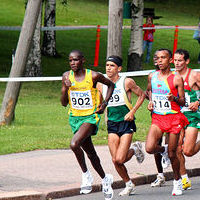For the last several months, I’ve written four articles a week for this website, plus Friday Links. That’s my baseline. Although occasionally I’ll do more, I take every step possible to ensure I don’t do less. Having this baseline means I occasionally miss the super-productive weeks where I could have written seven or eight articles. But it also means I avoid the more common low-productivity weeks where I only write one or two.
Before I created this baseline level of posting, I wrote as much as I felt I had time for. Occasionally that meant an article every day. More commonly, it meant only two or three. Although having a baseline can seem boring, or restrictive, I’ve found it is useful to avoid the low-productivity days that sabotage all of us.
Marathons are a Lot of Boring Steps, Not Glamorous Sprints
A lot of things in life are like running a marathon. Running at the same baseline speed, mile after mile, slowly but surely reaching your destination. Having a baseline in a marathon is more important than occasionally sprinting ahead.
If you’re trying to get in shape, going to the gym consistently matters a lot more than having one really good workout once a month. Having that fantastic workout isn’t important if your baseline is staying at home. When you run twenty-six miles, it doesn’t matter that you sprinted the first mile if you needed to walk the next seven.
Raising Your Baseline
Getting better at something once is easy. Maintaining that new standard consistently is a lot more difficult. It’s easy to write one article. It takes more focus to write articles four times a week, every week.
My goal with most areas of my life is to improve my baseline. Increase the default level of performance. Ironically, increasing your baseline often means limiting yourself and doing less than your capable of. Raising your baseline for the gym might mean doing fewer exercises and not pushing yourself as hard as you can. Raising your baseline for studying means spending fewer hours at the books than you feel is possible. Raising your baseline for social activities means being less outgoing and enthusiastic as you might be able to stir up.
Sustainable Changes
Trying to do your best can sabotage your efforts to increase your baseline. If you start a workout plan with the most intense exercise you can think of, you might be too sore to go to the gym for the entire next week. If you start trying to study seven hours a day, you might burn out before you learn all the material.
When consistency is important, I think it’s better to do what is sustainable. Do better, but only at a level you can do day after day. This mean taking a smaller step up from your previous baseline than you might feel is possible.
   How to Improve Your Baseline
You can’t raise the bar if you don’t know where it is. If you want to raise your baseline, you need to know what your default level of activity is. Not how you perform on your best days, but the average.
The only way to do this is to measure yourself over a period of time. Keeping records allows you to look backwards in time and see your average performance over months and years. Testing yourself for a week or less usually only tracks temporary performance.
Here are just a few things I keep numbers on, so I can be clear what my baseline is:
- Â Â Â Weight
- Â Â Â Articles written
- Â Â Â Expenses
- Â Â Â Income
- Â Â Â Books read
By keeping records of these, I can pour back over the months and quickly calculate what my averages are, and whether I’m improving or sliding.
Once you get a clear picture of where you baseline is, you can raise it by adding new habits. By making these habit changes less than you are capable of, you have a better chance of permanently raising the baseline.
Why is Baseline Thinking Important?
Slowly raising the default (and avoiding temporary bursts) matters when you need to be consistent. This applies to many areas of life, but there are a few exceptions. When you need to perform infrequently, this kind of thinking isn’t useful. Giving a speech, competing in sports or going to an interview aren’t times to hold back.
However, most of life isn’t a performance. It’s daily events that need to happen whether you are full of motivation or just want to get your work finished. By ratcheting up the baseline of what you consider acceptable, you can get better without sliding back.


 I'm a Wall Street Journal bestselling author, podcast host, computer programmer and an avid reader. Since 2006, I've published weekly essays on this website to help people like you learn and think better. My work has been featured in The New York Times, BBC, TEDx, Pocket, Business Insider and more. I don't promise I have all the answers, just a place to start.
I'm a Wall Street Journal bestselling author, podcast host, computer programmer and an avid reader. Since 2006, I've published weekly essays on this website to help people like you learn and think better. My work has been featured in The New York Times, BBC, TEDx, Pocket, Business Insider and more. I don't promise I have all the answers, just a place to start.